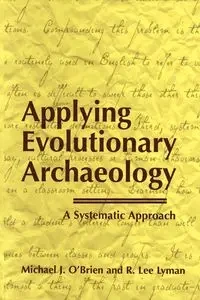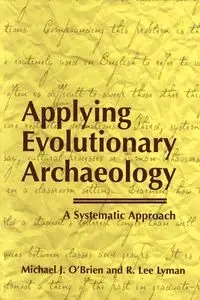Applying Evolutionary Archaeology - Michael J. O'Brien
Applying Evolutionary Archaeology - Michael J. O'Brien
- A Systematic Approach
AutorzyMichael J. O'Brien
EAN: 9780306462542
Marka
Symbol
183HHT03527KS
Rok wydania
2000
Strony
496
Oprawa
Miekka
Format
15.6x23.4cm
Język
angielski

Bez ryzyka
14 dni na łatwy zwrot

Szeroki asortyment
ponad milion pozycji

Niskie ceny i rabaty
nawet do 50% każdego dnia
Niepotwierdzona zakupem
Ocena: /5
Marka
Symbol
183HHT03527KS
Kod producenta
9780306462542
Rok wydania
2000
Strony
496
Oprawa
Miekka
Format
15.6x23.4cm
Język
angielski
Autorzy
Michael J. O'Brien

Anthropology, and by extension archaeology, has had a long-standing interest in evolution in one or several of its various guises. Pick up any lengthy treatise on humankind written in the last quarter of the
nineteenth century and the chances are good that the word evolution will appear somewhere in the text. If for some reason the word itself is absent, the odds are excellent that at least the concept of change over time will
have a central role in the discussion. After one of the preeminent (and often vilified) social scientists of the nineteenth century, Herbert Spencer, popularized the term in the 1850s, evolution became more or less a household
word, usually being used synonymously with change, albeit change over extended periods of time. Later, through the writings of Edward Burnett Tylor, Lewis Henry Morgan, and others, the notion of evolution as it applies to
stages of social and political development assumed a prominent position in anthropological disc- sions. To those with only a passing knowledge of American anthropology, it often appears that evolutionism in the early twentieth
century went into a decline at the hands of Franz Boas and those of similar outlook, often termed particularists. However, it was not evolutionism that was under attack but rather comparativism- an approach that used the
ethnographic present as a key to understanding how and why past peoples lived the way they did (Boas 1896).
EAN: 9780306462542
EAN: 9780306462542
Niepotwierdzona zakupem
Ocena: /5
Zapytaj o produkt
Niepotwierdzona zakupem
Ocena: /5
Napisz swoją opinię

